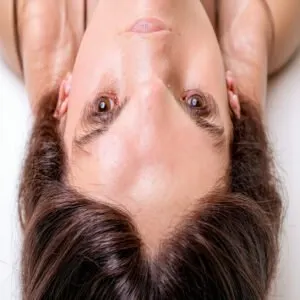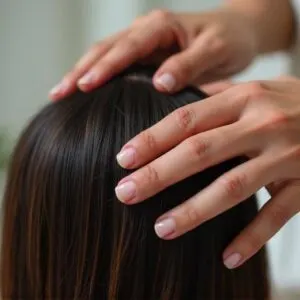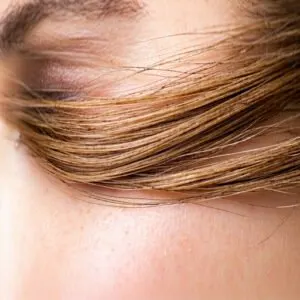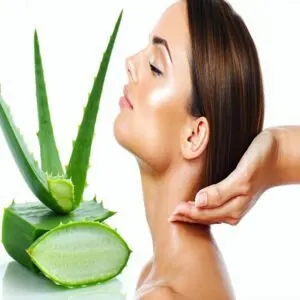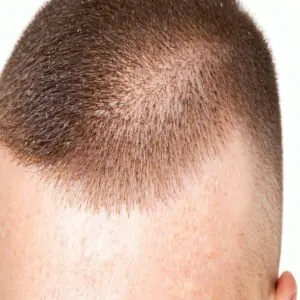This site is supported by our readers. We may earn a commission, at no cost to you, if you purchase through links.

Wash your hair 2-3 times a week using a gentle shampoo to stop oil buildup and flakes.
Watch your diet—foods rich in zinc, omega-3s, and healthy fats, like salmon or avocados, keep your scalp happy.
Stress doesn’t just mess with your mood—it can trigger flakes too, so try a quick scalp massage or deep breathing to relax.
For natural remedies, tea tree oil and apple cider vinegar fight fungus and soothe irritation.
A little care goes a long way—your scalp (and your shoulders) will thank you!
Table Of Contents
- Key Takeaways
- Dandruff Prevention Basics
- Scalp Care Routine
- Healthy Scalp Habits
- Natural Remedies for Scalp
- Maintaining Scalp Health
- Frequently Asked Questions (FAQs)
- How can I prevent dandruff?
- How do you get rid of hair dandruff?
- How to prevent dandruff in winter?
- Should you wash your hair if you have dandruff?
- Can diet help prevent dandruff?
- Is dandruff difficult to treat?
- How do I stop my scalp from getting dandruff?
- Can scalp treatment reduce dandruff?
- Is dandruff caused by poor scalp maintenance?
- Why my scalp is producing so much dandruff?
- Conclusion
Key Takeaways
- Keep your scalp clean by washing 2-3 times weekly with gentle shampoo, but don’t overwash as it can strip natural oils and worsen dandruff.
- Strengthen your scalp health through diet by eating foods rich in zinc and omega-3s like salmon, nuts, and avocados while avoiding processed snacks.
- You’ll reduce flaking by managing stress levels through scalp massages and gentle exfoliation, as high cortisol levels can disrupt your scalp’s oil production.
- Try natural remedies like tea tree oil and apple cider vinegar to fight fungal growth and balance your scalp’s pH, but always dilute them before application.
Dandruff Prevention Basics
Keeping your scalp clean and healthy is the first step to stopping dandruff in its tracks.
By focusing on diet, stress, and regular scalp care, you’ll lower your chances of dealing with flakes.
Importance of Scalp Hygiene
Scalp hygiene is your first defense against dandruff.
A clean scalp keeps hair follicles healthy and balances oil for flake prevention.
Here’s how:
- Wash regularly to remove buildup and maintain scalp health.
- Massage your scalp during shampooing to boost circulation and support hair follicles.
- Use gentle products to avoid irritation and keep scalp care effective.
This approach emphasizes the importance of scalp hygiene as a preventive measure, highlighting the need for regular washing and gentle products to maintain a healthy scalp, which is crucial for preventing dandruff.
Role of Diet in Dandruff Prevention
Eating the right foods can make your scalp happier.
Boost zinc intake with nuts and seeds, enjoy the omega benefits of fatty fish, and embrace leafy greens for a solid vitamin balance.
For a balanced approach to scalp health, consider exploring the ultimate dandruff diet.
Healthy fats like avocados nourish your scalp, while a diet low in sugar keeps flakes at bay.
Swap processed snacks for whole grains—your scalp will thank you!
Managing Stress for Healthy Scalp
A healthy scalp isn’t just about what you eat—stress plays a big role too.
Ever noticed how stress triggers flakes?
High cortisol messes with oil production, making dandruff worse.
For further insights into stress-related scalp problems, consult this helpful Vogue article.
Boost your scalp care by trying relaxation methods like mindful breathing or meditation techniques to keep emotional balance.
Scalp massages help too—they’re a great mix of stress reduction and pampering.
Scalp Care Routine
A good scalp care routine keeps dandruff in check and your scalp healthy. By using gentle techniques, the right shampoo, and softened water, you can stop flakes before they start.
Gentle Massage Techniques
Using circular motions with your fingertips, gently massage your scalp for a few minutes daily.
This boosts blood flow, encouraging a healthy scalp and reducing flakes.
Add a soft touch with massage oils like coconut or tea tree for extra scalp stimulation.
Keep the pressure light—you’re soothing, not scrubbing, it’s simple scalp care that feels fantastic!
Proper Shampooing Frequency
Finding the right shampoo schedule can make or break your dandruff prevention game.
For most, washing 2-3 times a week keeps scalp balance in check.
Too frequent washing strips oils, while skipping can worsen dandruff triggers.
Try shampoo rotation with a dandruff-specific formula for scalp treatment.
Understanding the ideal shampoo frequency guide is vital for maintaining a healthy scalp.
Remember, consistency in hair washing equals healthier scalp care and fewer flakes!
Using Softened Water
If hard water’s messing with your scalp, try softened water—it’s like a spa day for your hair.
Soft water removes minerals that disrupt your scalp’s pH balance, preventing dry scalp and flakes.
Plus, it lathers well, saving shampoo, and whether it’s Water Purification Methods at home or simple Mineral Removal Techniques, this scalp care tip makes dandruff prevention easier and effective.
Using Soft Water Systems can be an effective way to achieve this, making scalp care a more manageable task.
Healthy Scalp Habits
Taking care of your scalp doesn’t have to be complicated, but sticking to a few good habits can make all the difference.
Avoid harsh chemicals, limit styling products, and exfoliate gently to keep your scalp healthy and flake-free.
Avoiding Harsh Chemicals
If your scalp’s screaming "help!", harsh chemicals might be the culprit.
Look for chemical-free products like shampoos with gentle cleansers and natural oils.
Avoid toxic ingredients like MIT or sulfates, which can disrupt your scalp’s pH balance.
Stick to these scalp care tips:
- Read labels carefully.
- Switch to gentle formulas.
- Ditch heavily medicated shampoos unnecessarily.
- Protect yourself from scalp irritation.
Limiting Styling Product Use
Styling products can sneakily lead to product buildup and greasy hair.
Swap heavy hair serums or styling creams for lightweight options to reduce oil.
Look for scalp-friendly alternatives to avoid irritation.
Here’s a quick guide:
| Product Type | Use Frequency | Scalp-Friendly Tip |
|---|---|---|
| Hair Serum | 2-3 times weekly | Choose non-greasy formulas |
| Styling Cream | Occasionally | Avoid alcohol-based ones |
| Strong Hold Gels | Special occasions | Opt for water-based gels |
Prioritize gentle styling for healthier results.
To maintain a healthy scalp, understanding scalp care tips is essential for preventing dandruff and promoting overall hair growth.
Regular Scalp Exfoliation
Styling product buildup can trigger a flaky scalp, but regular scalp exfoliation works wonders for dandruff prevention.
It clears dead skin, excess oil, and gunk, encouraging scalp renewal.
Use gentle scrubbing with natural exfoliants like sugar or salt to avoid irritation.
Weekly scalp treatment boosts scalp care, helping with flaking reduction while leaving your scalp refreshed and healthy.
Regular use of a Scalp Exfoliator tool is essential for removing dead skin cells and promoting a healthy scalp environment.
Natural Remedies for Scalp
You don’t need harsh products to care for your scalp—natural remedies can work wonders.
Simple options like tea tree oil, apple cider vinegar, and aloe vera help soothe, cleanse, and keep flakes at bay.
Benefits of Tea Tree Oil
Got a flaky scalp? Tea tree oil’s got your back! Used for centuries, this natural remedy fights fungus, soothes itchiness, and helps prevent dandruff.
Here’s why it’s great:
- Fights fungal overgrowth (bye, flakes!).
- Calms irritated scalps.
- Promotes smoother scalp textures.
- Packed with antimicrobial power.
- Works well in diluted oil therapy.
Tea tree oil also has benefits for skin issues, including its use in tea tree oil treatments.
Say hello to comfortable scalp care!
Using Apple Cider Vinegar
Tea tree oil isn’t the only trusty option—apple cider vinegar deserves a spot in your scalp care kit.
Its vinegar benefits include balancing scalp pH and controlling fungus, making it a natural remedy to prevent dandruff.
Dilute it, use as a rinse or pre-shampoo treatment, and watch it exfoliate buildup, restore hair, and support healthier scalp products.
For ideal results, understanding apple cider vinegar properties is essential to maximize its natural remedy benefits in scalp care routines.
Aloe Vera for Soothing Scalp
Apple cider vinegar works wonders, but don’t sleep on aloe vera.
Its soothing properties calm an itchy scalp and reduce irritation, thanks to its natural soothers like vitamins and minerals.
Vera gel acts as a gentle scalp moisturizer, easing dandruff prevention while stripping excess oil.
It’s like giving your scalp a rejuvenating drink – simple, effective, and oh-so-relieving.
Maintaining Scalp Health
Keeping your scalp healthy isn’t just about looking good—it’s about feeling good too.
By using a humidifier, protecting your scalp from the sun, and keeping up with regular trims, you can prevent dandruff and support healthy hair growth.
Importance of Humidifiers
Dry winter air can leave your scalp itching and flaking like crazy.
That’s where a humidifier shines—it’s like a hydration hero for your home.
Humidifier benefits include restoring moisture to the air, which helps with scalp hydration and prevents dandruff.
It’s a simple dry air solution that improves both air quality and your scalp care routine.
Protecting Scalp From Sun Damage
Too much sun exposure can lead to scalp irritation and even painful sunburn.
Protect your scalp by applying sunscreen near your hairline and parting.
UV protection is key, so grab a wide-brimmed sun hat or scarf for extra shielding.
Even your hair can help—try styles that cover more of your scalp to reduce UV light damage.
Regular Trims for Healthy Hair Growth
Snip away those split ends, regular trims both keep your hair looking fresh and prevent breakage, keeping strands healthy and strong.
Trim benefits include promoting healthier ends and helping your scalp thrive by reducing tangles.
Pair it with the best scalp care practices—like scalp massage and proper hair washing—to boost growth and maintain vibrant, tangle-free locks.
Frequently Asked Questions (FAQs)
How can I prevent dandruff?
Don’t let dandruff crash your hair party!
Massage your scalp gently, rinse well, and avoid over-washing.
Stick to pH-balanced shampoos, limit styling products, and eat scalp-loving foods like zinc-rich nuts and omega-packed fish.
How do you get rid of hair dandruff?
Tackle dandruff by using anti-dandruff shampoos with active ingredients like zinc pyrithione or ketoconazole.
Rinse thoroughly, avoid over-washing, and manage stress.
If home treatments fail, talk to a dermatologist for stronger options.
How to prevent dandruff in winter?
Winter’s dry air can ramp up dandruff.
Keep your scalp hydrated by using a humidifier, moisturizing shampoos, and avoiding hot water.
Gently massage your scalp to boost circulation, and don’t skip omega-3s in your diet!
Should you wash your hair if you have dandruff?
Funny thing about dandruff – it thrives when your scalp gets too oily or too dry.
Washing your hair helps strike a balance, but stick to anti-dandruff shampoos and avoid harsh products to keep flakes away.
Can diet help prevent dandruff?
What you eat can definitely help!
A diet rich in zinc, B vitamins, and omega-3s supports scalp health.
Think leafy greens, nuts, and fatty fish.
Staying hydrated and skipping sugary junk also helps keep flakes at bay.
Is dandruff difficult to treat?
Imagine battling dandruff for months, constantly switching shampoos.
Don’t worry, it’s not unbeatable! With consistent care, the right products, and patience, you can tackle it.
Some cases take time, but it’s totally manageable.
How do I stop my scalp from getting dandruff?
Wash your hair regularly with a gentle dandruff shampoo, rinse thoroughly to remove buildup, and don’t scratch.
Keep stress in check, eat nutrient-rich foods, and avoid hair products that irritate your scalp.
Stay consistent!
Can scalp treatment reduce dandruff?
Yes, dedicated scalp treatments with ingredients like salicylic acid, zinc pyrithione, or ketoconazole can reduce dandruff substantially.
You’ll need to be consistent with application and might need to alternate between different treatments for best results, using a method that includes ketoconazole.
Is dandruff caused by poor scalp maintenance?
Like a garden needs care, your scalp isn’t just acting up from neglect alone.
While poor maintenance can worsen dandruff, it’s often caused by factors like yeast overgrowth, skin conditions, or stress.
Why my scalp is producing so much dandruff?
Your scalp’s producing excess dandruff due to an overgrowth of Malassezia fungus, which thrives in oily conditions.
Stress, hot showers, and certain medications can worsen it by disrupting your scalp’s natural balance.
Conclusion
Taking care of your scalp might seem like extra work, but preventing dandruff with scalp care is simpler than you’d think.
Once you find your groove with gentle cleansing, regular massages, and natural treatments, you’ll wonder why you didn’t start sooner.
Remember, a healthy scalp means healthy hair – and no more brushing flakes off your shoulders.
Give these tips a try, stick with what works for you, and enjoy your flake-free future.
- https://www.wikihow.com/Prevent-and-Treat-Dandruff
- https://www.reinbraids.com/blogs/news/how-to-prevent-dandruff-when-wearing-braids-simple-scalp-care-tips
- https://napturallyval.com/how-to-prevent-dandruff-on-4c-natural-hair/
- https://betterhair.com/article/dandruff-decoded-causes-treatments-and-preventative-measures
- https://www.amazon.com/Anti-Dandruff-Treatment-Psoriasis-Seborrheic-Dermatitis/dp/B0889GWBBN

